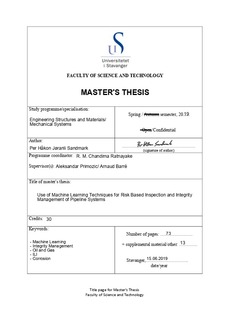| dc.contributor.advisor | Ratnayake, Chandima | |
| dc.contributor.author | Sandmark, Per Håkon Jøranli | |
| dc.date.accessioned | 2019-10-09T09:26:30Z | |
| dc.date.available | 2019-10-09T09:26:30Z | |
| dc.date.issued | 2019-06-15 | |
| dc.identifier.uri | http://hdl.handle.net/11250/2621110 | |
| dc.description | Master's thesis in Mechanical Engineering | nb_NO |
| dc.description.abstract | This thesis demonstrates the use of machine learning for integrity management and assessment of pipeline integrity using various types of classification algorithms on comprehensive in-line inspection data. Machine learning is a subfield of artificial intelligence that includes abstruse statistical techniques enabling machines to improve problem solving experience and excels at identifying underlying statistical patterns enhancing in example predictive models, anomaly detection, and operational monitoring. Machine learning has been used with tremendous success on a range of problems across industries, and while it is important to be grounded and have realistic expectations for the value gain, there is no reason to believe that the oil and gas industry are any different as the literature study show.
Pipeline corrosion is one of the primary causes for pipeline failure. It is necessary to continuously monitor and analyze the pipeline to predict possible failures and ensure safe operation. In the oil and gas industry, In-line inspection (ILI) is an essential part of the integrity management (IM) of pipeline system. Corrosion is one of the primary concerns for the IM of a pipelines due to the potential for leakages and catastrophic failures. ILI allows for routine inspections of pipelines with high accuracy and is a great tool for identifying corrosion damage, and if necessary, is used to decide whether further detailed investigation is necessary. As a proactive IM strategy, it is highly dependent on the ability to accurately predict rate of corrosion growth.
The thesis gives the necessary theoretical background to integrity management of pipelines with the inherent risks of operation, failure modes, and defect assessment. The literature study focuses on the historical development and current developments for machine learning in the oil and gas industry, followed by a client case where various supervised machine learning models is developed and used to determine the structural integrity of sections of a pipeline based on data from in-line inspections with the objective of determining the suitability of machine learning for defect assessment and potential use in assisting predictive corrosion models.
The various machine learning models are developed through extensive experimentation with inspiration from other research and problem domains. As the ILI inspection supply comprehensive data, the importance of imposing constraints is important in order to make findings relevant in practice. The machine learning models performed well on the available pipeline data, and models such as the XGBoost Classifier predicted class labels with accuracy of 100.0%. There are limitations to the models as they were not developed to take into account the assessment of complex shaped defects but the results are promising, and we can argue the case demonstrates the wider potential for machine learning in future work on defect assessment and integrity management. | nb_NO |
| dc.language.iso | eng | nb_NO |
| dc.publisher | University of Stavanger, Norway | nb_NO |
| dc.relation.ispartofseries | Masteroppgave/UIS-TN-IMBM/2019; | |
| dc.rights | Navngivelse 4.0 Internasjonal | * |
| dc.rights.uri | http://creativecommons.org/licenses/by/4.0/deed.no | * |
| dc.subject | ILI | nb_NO |
| dc.subject | machine learning | nb_NO |
| dc.subject | integrity management | nb_NO |
| dc.subject | maskinlæring | nb_NO |
| dc.subject | corrosion | nb_NO |
| dc.subject | oil and gas | nb_NO |
| dc.subject | olje og gass | nb_NO |
| dc.title | Use of Machine Learning Techniques for Risk Based Inspection and Integrity Management of Pipeline Systems | nb_NO |
| dc.type | Master thesis | nb_NO |
| dc.subject.nsi | VDP::Technology: 500::Mechanical engineering: 570::Machine construction and engineering technology: 571 | nb_NO |

